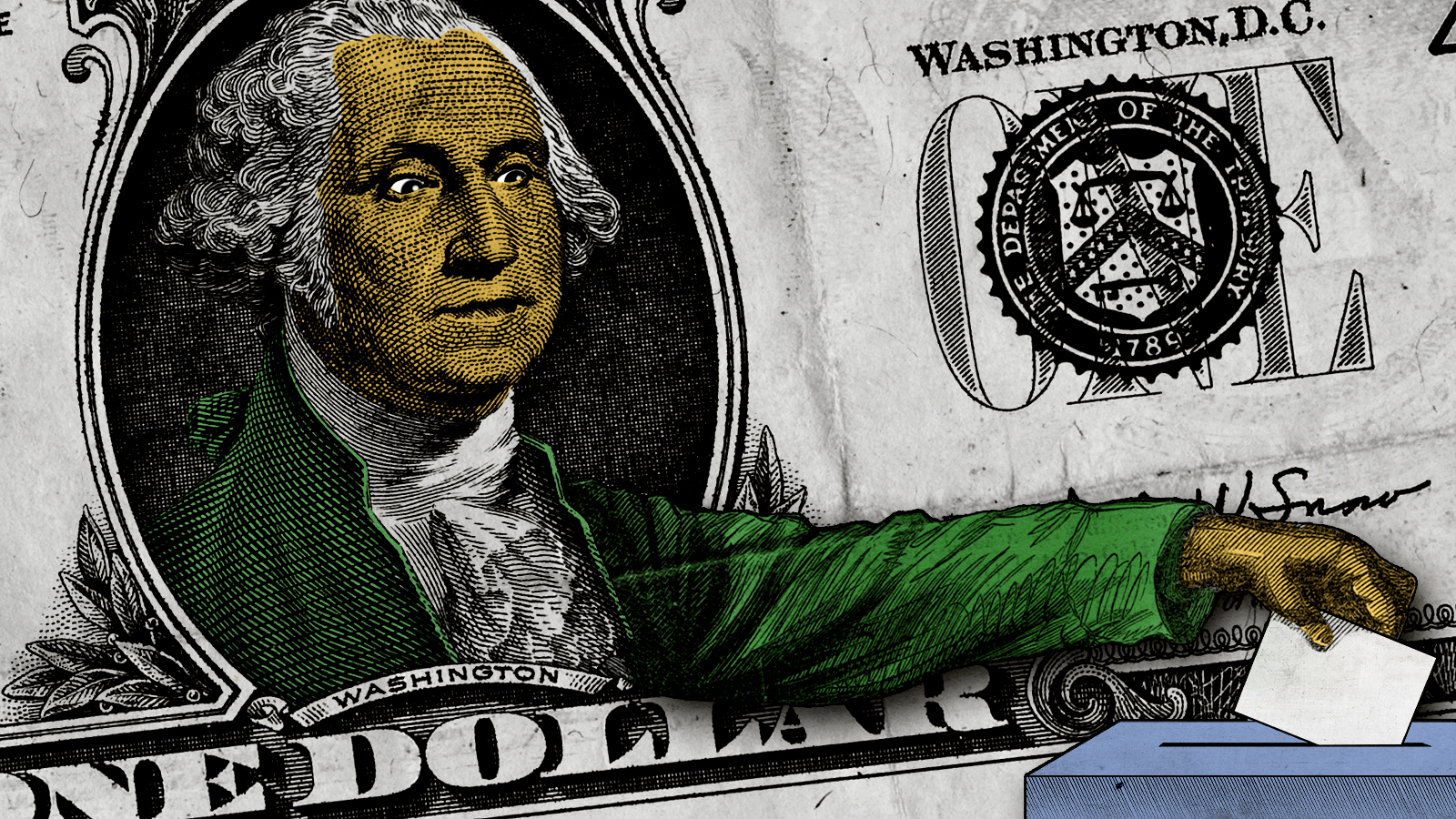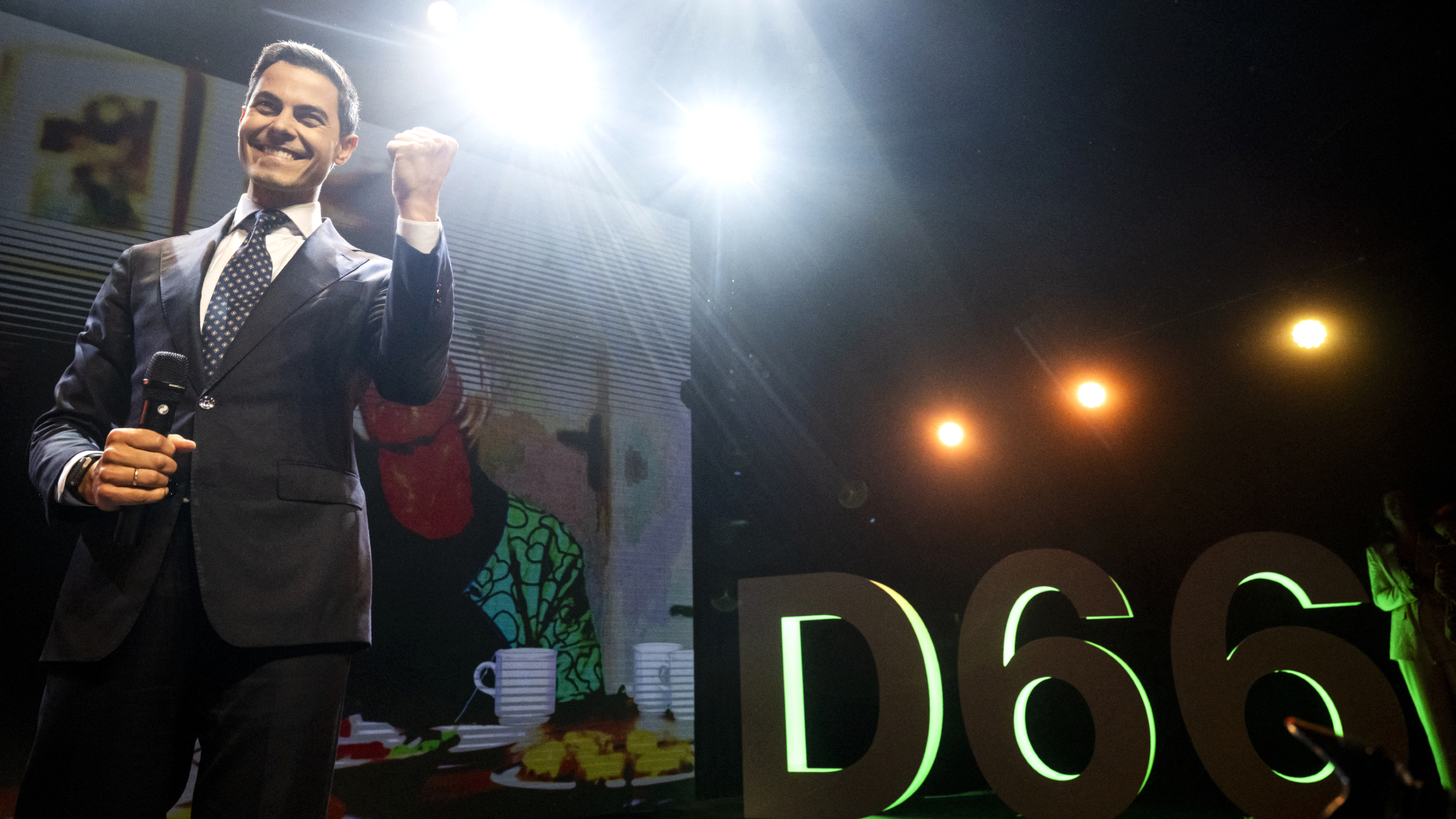What the state of the U.S. economy means for the midterm elections
Rent, grocery, gas, and utility bills are up. Which party can help?


A free daily email with the biggest news stories of the day – and the best features from TheWeek.com
You are now subscribed
Your newsletter sign-up was successful
Concerns about the U.S economy are mounting as experts warn that persistent inflation could lead to a recession. The effects of the rising costs are hitting close to home for many voters, turning their attention away from other issues as the midterm elections near. Recent polls show that, as a result, the tide may be turning in favor of Republicans in the contentious battle for the House. Here is everything you need to know about the economy's effect on the midterm elections:
What economic issues are voters most likely to be affected by?
The latest inflation data published by the Bureau of Labor Statistics showed September's Consumer Price Index (CPI) increased by 0.4 percent. Prices over the past year have risen 8.2 percent as of September, per The Washington Post. The price hikes heavily affected household budgets, as the September CPI was primarily influenced by rising rent, grocery, and utility costs. The prices in these categories have been consistently high for the past few months but were slightly offset by a 4.9 percent drop in gas prices. That reprieve was short, as the downtrend in gas prices is reversing, per The New York Times. The CPI has decreased from its 9 percent peak in July, but it is still close to its highest its been in 40 years, per the Post.
The latest data indicates that the Federal Reserve will likely raise interest rates by another 0.75 percent in November. The central bank has been trying to regain control of inflation by raising the interest rates five times over the last year, but it has had little effect on combatting inflation. If the central bank is forced to continue to raise rates with little impact, they risk sending the country into a recession, per the Post.
The Week
Escape your echo chamber. Get the facts behind the news, plus analysis from multiple perspectives.

Sign up for The Week's Free Newsletters
From our morning news briefing to a weekly Good News Newsletter, get the best of The Week delivered directly to your inbox.
From our morning news briefing to a weekly Good News Newsletter, get the best of The Week delivered directly to your inbox.
A recent survey of economists conducted by The Wall Street Journal found that 63 percent of the experts believe the country will be heading into a recession within the next 12 months, up from 49 percent in July's survey.
How important are the economy and inflation for voters this year?
Several recent polls have shown that the economy and inflation are high on the list of essential issues among likely voters ahead of the midterm elections. The two issues are emerging as the dominant concerns for voters as inflation and a looming recession hover over the nation. This change in political sentiment could give Republicans what they need to regain the edge they lost to Democrats following the Supreme Court's decision to overturn Roe V. Wade, CNN reports.
In the most recent CBS News/YouGov survey, 65 percent of voters reported feeling the economic situation is getting worse, and 68 percent said the Biden administration could be doing more to fight inflation. The poll also found that 48 percent felt the Democrats' policies had worsened the economy. Forty-two percent felt that Republican policies would improve the state of the economy. The CBS News/YouGov Battleground Tracker survey was conducted with 2,068 registered voters interviewed between October 12-14, 2022. The margin of error is +/- 2.4 percent.
A recent New York Times/Siena College poll also showed the economy and inflation topped the list of the country's most important issues, 26 and 18 percent, respectively. Sixty-four percent of voters surveyed felt the country was headed in the wrong direction. The New York Times/Siena College poll surveyed 792 registered voters via cellular and landline phones from Oct. 9 to Oct. 12. The margin of error is +/- 4.0 percentage points for registered voters and +/- 4.1 percentage points for the likely electorate.
A free daily email with the biggest news stories of the day – and the best features from TheWeek.com
Who do voters trust to handle issues with the economy?
Republicans stand to win over unclaimed voters who have voiced concerns about the economy. The Times/Siena College poll found that 49 percent of likely voters planned to vote for a Republican candidate for Congress in the midterms, while 45 percent plan to vote for a Democrat. This is a reversal from the poll's September results, where Democrats had a 1-point lead among likely voters.
The same poll showed that undecided voters moved towards Republicans, with the most striking difference being among women independent voters who swung from backing Democratic candidates with a 14-point lead in September to leaning towards Republicans with an 18-point lead this month. Voters who reported the economy as their top concern favored Republicans by more than a 2-to-1 margin, per the Times.
The results of recent polls point to another change in the overall political mood of the country, which went from strongly favoring the Republicans before abortion rights surged into the discussion, tipping the scales towards the Democrats. Now that momentum has started to plateau, allowing the Republicans to make a comeback, CNN reports.
Theara Coleman has worked as a staff writer at The Week since September 2022. She frequently writes about technology, education, literature and general news. She was previously a contributing writer and assistant editor at Honeysuckle Magazine, where she covered racial politics and cannabis industry news.
-
 The Olympic timekeepers keeping the Games on track
The Olympic timekeepers keeping the Games on trackUnder the Radar Swiss watchmaking giant Omega has been at the finish line of every Olympic Games for nearly 100 years
-
 Will increasing tensions with Iran boil over into war?
Will increasing tensions with Iran boil over into war?Today’s Big Question President Donald Trump has recently been threatening the country
-
 Corruption: The spy sheikh and the president
Corruption: The spy sheikh and the presidentFeature Trump is at the center of another scandal
-
 Kurt Olsen: Trump’s ‘Stop the Steal’ lawyer playing a major White House role
Kurt Olsen: Trump’s ‘Stop the Steal’ lawyer playing a major White House roleIn the Spotlight Olsen reportedly has access to significant US intelligence
-
 Japan’s Takaichi cements power with snap election win
Japan’s Takaichi cements power with snap election winSpeed Read President Donald Trump congratulated the conservative prime minister
-
 How realistic is the Democratic plan to retake the Senate this year?
How realistic is the Democratic plan to retake the Senate this year?TODAY’S BIG QUESTION Schumer is growing bullish on his party’s odds in November — is it typical partisan optimism, or something more?
-
 The billionaires’ wealth tax: a catastrophe for California?
The billionaires’ wealth tax: a catastrophe for California?Talking Point Peter Thiel and Larry Page preparing to change state residency
-
 Bari Weiss’ ‘60 Minutes’ scandal is about more than one report
Bari Weiss’ ‘60 Minutes’ scandal is about more than one reportIN THE SPOTLIGHT By blocking an approved segment on a controversial prison holding US deportees in El Salvador, the editor-in-chief of CBS News has become the main story
-
 Has Zohran Mamdani shown the Democrats how to win again?
Has Zohran Mamdani shown the Democrats how to win again?Today’s Big Question New York City mayoral election touted as victory for left-wing populists but moderate centrist wins elsewhere present more complex path for Democratic Party
-
 Dutch center-left rises in election as far-right falls
Dutch center-left rises in election as far-right fallsSpeed Read The country’s other parties have ruled against forming a coalition
-
 Millions turn out for anti-Trump ‘No Kings’ rallies
Millions turn out for anti-Trump ‘No Kings’ ralliesSpeed Read An estimated 7 million people participated, 2 million more than at the first ‘No Kings’ protest in June
